Unit 5 International charities教案
- 格式:doc
- 大小:123.00 KB
- 文档页数:19

牛津8B Unit5International charities教学案B Unit 5 International charities第一课时教学案【教学目标】1. Enabludleaational chaand learn to u“used to” and “be used to”.2. Enabludaabillistening and speakingabluddiscuss how to help peoplareas.【预习导学】Ⅰ.汉译英1.国际慈善组织 2.零花钱3.习惯于 4.过去常常医疗 6.在餐馆的隔壁Ⅱ.用单词的适当形式填空。
I’m not used to (go)out before lu2. You used to (be )very kindI’m so weak that I can’t walk any (far).【典型例题精析】a国际ational adj. 国际的international charities 国际慈善机构2零花钱u havleft. 你还剩一些零花钱。
left 过去分词作后置定语, 表示“剩下的”。
举一反三: Td (leave).3.I’m not used to going out before lunch. 午餐前我不习惯外出。
be used to 习惯于…举一反三:I’m used to (have) a rest after lu.You used to be very kind你以前对我很好。
used to do sth 过去常常………⑴表示过去的事实、情况,后面跟动词原形。
He used to be a teacher. 他曾是一名教师。
⑵ used to的否定形式为usedn’t to do 或didn’t use to doWe usedn’t to go swimming. We didn’t use to go swimming.⑶ used to的疑问形式Used … to… Did … use to do …?Used he to go hiking? Did he use to go hiking?⑷ used to的反意疑问句一般用didn’t …Brown used to get up early, didn’t she ?举一反三:used to (run)g, but nowused to (get) up la. so+形容词/ 副词+ that从句,that后跟结果状语从句。

《Unit 5 International charities Integrated skills》教学设计【教学目标】知识目标:1.掌握本课时的四会单词:war词组:make a donation do voluntary work instead of句型:UNICEF helps make the world a better place for children. UNICEF believes that all children should have clean waterand food so that they can be healthy.2.了解联合国儿童基金会的工作范畴及基本的背景知识。
能力目标:1. 能从听力材料中获取相关有用的信息。
2. 能用已掌握的信息使相关文章的意思表达完整。
3. 能谈论自己为慈善组织做贡献的想法。
情感目标:1. 通过小组合作学习,学生能感受合作的愉快,培养合作精神。
2. 联系实际生活,学生能意识到互相帮助的重要性,培养社会责任感,长大后能为慈善组织做贡献。
【教学重点、难点】1.从听力材料中获取相关有用的信息并了解联合国儿童基金会的工作范畴及基本的背景知识。
2. 谈论自己为慈善组织做贡献的想法。
【教学步骤】Step 1 RevisionShow students the logos of some internationl charities , have a competition to revise different charities around the world. (ORBIS, Oxfam, World Vision, World Wide Fund for Nature, UNICEF)Say to students: we’ve learned some internationl charities. First ,let’s have a competition, I’ll show you the logos of the charities one by one, If you can tell each of their names correctly, you will get one point for your group. If you can tell what each of them does, you can get two points for your group.Step 2 Presentition1.Show students some pictures of poor children around the world (some of them don’t have food or clean water, some of them are homeless because of the war, some ofthem have to go to work to support their families instead of going to school……) .Ask students : What problems do these children have ?Teach new words : war, instead of.2. Ask students to discuss in groups of four:Which charity can help these children?What do you know about UNICEF?Step 3 CompetitionRound 1: Read the information about UNICEF in PartA2 on Page86. Answer the questions :(1)When was UNICEF set up ?(2)What’s the aim of UNICEF?(3)Why was UNICEF set up?(4)How many countries and areas does UNICEF work in?Round 2: Read the information about UNICEF in PartA1 on Page86. 2. Judge the sentences and correct the mistakes.(1)UNICEF wants children to go to work.(2)UNICEF provides clean water, food and education for poor children inmany countries.(3)UNICEF raises money by selling books and organizing otherfund-raising activities..(4)You can help UNICEF only by doing some voluntary work.Round 3: Listen and finish PartA1 on Page 86: Help Daniel put the sentences into the correct order. Write the numbers 1-5 in the boxes.Step 4 Pair workHave an interview.Work in pairs: Suppose one of you is a reporter, and the other is a UNICEF worker. The reporter is interviewing the worker about the history of UNICEF and its main work. Ask several pairs to practise the dialogue out.Step5 Group workAsk students to work in groups of four : Complete the report in PartA4 on Page87. Then check the answers.Step6 ListeningListen to the conversation between Kitty and Daniel and answer the questions:1. What is Kitty’s favourite charity? Why?2.What is Daniel’s favourite charity? Why?Step7 Pair workAsk students to make up similar dialogues to talk about their favourite charities. Step8 DiscussionAsk students to discuss in groups of four: Would you like to do something for charities when you grow up? Which charity would you like to help most? Why? How would you like to support it? Before they discuss , tell them : each group should choose a reporter. Then ask several reporters to give a report.Step9 SummaryAsk students to conclude what we have learned this class.Tell students it’s important for us to help charities around the world . Choose the best group in this class.Step10 HomeworkSearch for more information about UNICEF on the Internet. Write a brief introduction about UNICEF.【设计理念】根据新课标,英语学习的过程应以学生“用英语做事”为主线,强调培养学生综合语言运用能力,在做事情的过程中发展语言能力、思维能力以及交流与合作的能力的理念而设计,借助于多媒体课件力求课堂教学最优化。

oaded[设计说明]通过播放“We are the world”歌曲的音频,让同学们感受一下国际慈善演出现场的气氛,使学生在欣赏轻松愉快的歌曲时,引入本单元的内容,从而激发他们的学习兴趣和求知欲望。
1. Revision.T: We can many ways. Many charities can also you name some charities in China? S: Project Hope, Project Green Hope, Spring Bud Project and Save China’s Tigers. T: Who knows any International charities(Write on the Bb “International charities”and teach the new word “international”)[设计说明]通过复习中国慈善组织引出国际慈善组织并进行适当地引导和解释从而提高学生的学习热情。
2. ExplanationShow the pictures on the screen and present some charities around the world.a.ORBIS 奥比斯An international organization that doctors and nurses for many countries to cure blind people or people in poor eyesight.It works to international organization works to reduce poverty and injustice(不公正) in many countries. It can make our world become fair.【百度搜索】c. UNICEF 联合国儿童基金会This organization works to make sure that children , with food, .【百度搜索】?tp=0_01d. World Vision 世界宣明会An international charity which raises money for development projects in poor areas around the world. It can .【百度搜索】?tp=0_00e. WWF= World Wide Fund for Nature 世界自然基金会。

八年级英语Internationalcharities教案Unit5Internationalcharities一.教学内容:Unit5Internationalcharitiesords,phrasesandsentences二.教学目标:掌握Unit5的词汇及词性变化和课文中的重点词组、句型的结构和用法BUnit5Internationalcharities单词:国际的international口袋pocet习惯于beusedtosth./doing采访者intervie较远farther失明blindness影响v.affect/influence主要地,大部分地ostl病例case治疗/治愈cure/treat治疗/对待treatent预防/防止prevent做手术operate手术operation真正地/确实indeed自豪的/骄傲的proud疾病illness病人patient医学的/医疗的edical药edicine医院hospital改进,改善iprove志愿者volunteer继续下去,继续开展carryonith 富有的,丰富的rich同意,协议agreeent发明物,创意invention教育cate惩罚punish丑陋的ugl战争ar代替,而不是insteadof调查,研究research【典型例题】一、根据句意,完成句子。
oRBISneedsorev_______tocarryonithitscareer.Thep________erecuredandtheyereveryg_______tothedoct orsandnurses.UNIcEFisani____________charity.Thegovernenthopestohelporestudentsbyt_______oreteac hers.Soingcana______yourhealth.It’sh______.Thereereanother3c____ofSARSinthecountrylastonth.oreactionsshouldbetaentoiprovethe______caresysteino urcountry.Theancaetohiselfafteran8-houro________.childrenunder16yearsoldarep________frodrivingintheU S.0.Heneedstogetores____and__________togetajobtos_______hisfaily.【答案】volunteers2.patients,grateful3.international4.train ing5.affect,healthcases7.edicial8.operation9.presented10.sills,noledg e,support二、选词填空。

8B Unit 5 International charities (Revision)备课时间: 上课时间:教学目标:1.归纳运用慈善事业相关词汇、短语及重要句型。
2.正确运用used to 、be used to、so…that 以及such… that…等句型。
3.培养学生为慈善事业出力的意识,并能对具体事件进行描述。
教学重难点:1. Words:further ,mostly , afford , affect , operation, patient, proud , improve , invention, treat ,medicine,II. Phrases:be used to ,carry on ,be grateful to , work for , care about , instead of ,III. Sentences:1. All they need is enough money to carry on with their work.2. When I worked in a hospital, I used to do only two or three operations a day.3. I am not used to the hot weather.4. The good news is that 80 per cent of the cases of blindness can be cured or prevented.5. UNICEF wants to make the world a better place for children6. By training local doctors and nurses, we hope to help more people.7. It’s hard work but I’m used to it now.一、重点词汇【小试牛刀】1. The news did not___________ her at all. 这条消息对她没有一点影响。

牛津初中英语8B Unit 5 International charities一、教材分析根据新课标,突出学生自主学习的主体地位原则,培养学生自主、合作、探究精神、突出语言运用能力培养的理念而设计。
《英语课程标准》是以学生“能做某事”的描述方式来设定各级目标要求的。
这就决定了我们在教学中要尽量采用“任务型”的教学途径。
在这一教学环节中,教师的任务就是根据单元和课堂教学内容和目标,给学生设计一个阶段、一个单元和每一课的学习任务、目标,并锁定任务,吸引和组织他们积极参与,通过思考、调查、讨论、交流和合作等方式,学习和使用英语,完成学习任务。
本课内容为牛津初中英语8B第五单元的阅读课,讲的是采访ORBIS的医生。
必须把握两点:一,学生并不熟悉这类课文形式;二,学生也不熟悉本文涉及的慈善机构,学生并不清楚其背景。
慈善机构在当今人们的生活中,尤其是贫困地区人们的生活中起到了越来越重要的作用。
这些机构通过不同的方式帮助世界各地的人们。
本单元就是让学生重点了解UNICEF(联合国儿童基金会)、World Vision(世界宣明会)、ORBIS(奥比斯)、Oxfam(乐施会)、Wide fund for Nature(世界自然基金会)五个国际慈善机构。
激发学生乐于助人的情怀,激励他们好好学习,为贫困地区的人们贡献自己的一份力量。
二、学生分析学生处在价值观与人生观形成的重要时期,在学生掌握一定词汇量与阅读技能的基础上,应注意培养学生乐于助人的精神,激发他们好好学习。
三、教学目标知识目标1、掌握本课中斜体部分单词并识别其他生词:affect, mostly, case, cure, medical,treatment, operation, patient, afford, skill, train, operate, indeed, proud, medicine, treat, improve, carry on, interviewer, blindness, volunteer2、理解对话内容,能够说出ORBIS的作用。
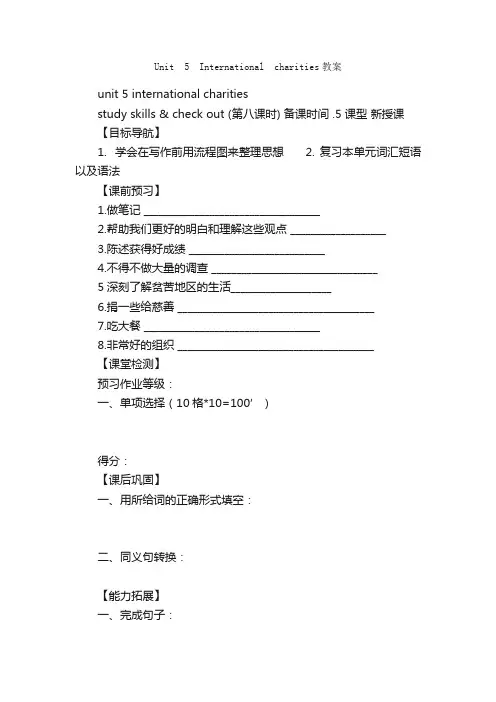
Unit 5 International charities教案unit 5 international charitiesstudy skills & check out (第八课时) 备课时间 .5 课型新授课【目标导航】1. 学会在写作前用流程图来整理思想2. 复习本单元词汇短语以及语法【课前预习】1.做笔记 ___________________________________2.帮助我们更好的明白和理解这些观点 ___________________3.陈述获得好成绩 ___________________________4.不得不做大量的调查 _________________________________5深刻了解贫苦地区的生活____________________6.捐一些给慈善 _______________________________________7.吃大餐 ___________________________________8.非常好的组织 _______________________________________【课堂检测】预习作业等级:一、单项选择(10格*10=100’)得分:【课后巩固】一、用所给词的正确形式填空:二、同义句转换:【能力拓展】一、完成句子:1. 我妈妈告诉我污染是一个非常严重的问题。
my mother told me ________ __________ __________ ________ __________ __________.2. 我过去常把所有的零花钱花在衣服和零食上。
i ________ __________ __________ all my ________ __________ __________ clothes and snacks.3. 许多医生被邀请到这个医院来治疗他的病。
many doctors ________ __________ __________ the hospital _______ _________ _________ _________.4. 现在我尽量省钱捐款给慈善机构。
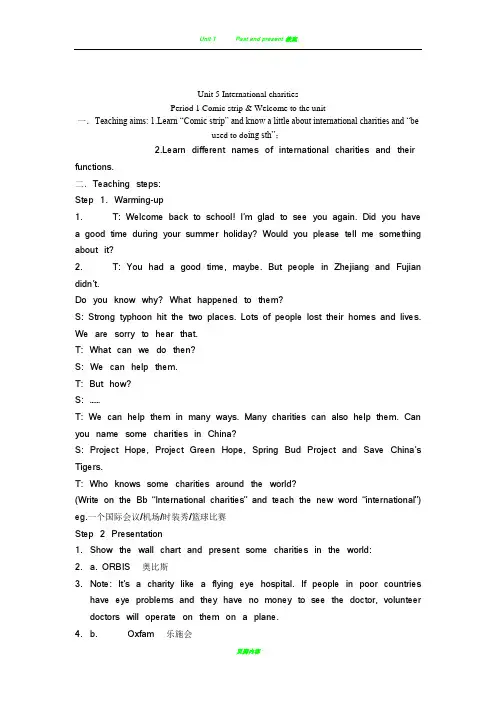
Unit 5 International charitiesPeriod 1 Comic strip & Welcome to the unit一.Teaching aims: 1.Learn “Comic strip” and know a little about international charities and “beused to do ing sth”;2.Learn different names of international charities and their functions.二.Teaching steps:Step 1. Warming-up1. T: Welcome back to school! I’m glad to see you again. Did you havea good time during your summer holiday? Would you please tell me something about it?2. T: You had a good time, maybe. But people in Zhejiang and Fujian didn’t.Do you know why? What happened to them?S: Strong typhoon hit the two places. Lots of people lost their homes and lives. We are sorry to hear that.T: What can we do then?S: We can help them.T: But how?S: ……T: We can help them in many ways. Many charities can also help them. Can you name some charities in China?S: Project Hope, Project Green Hope, Spring Bud Project and Save China’s Tigers.T: Who knows some charities around the world?(Write on the Bb “International charities” and teach the new word “international”) eg.一个国际会议/机场/时装秀/篮球比赛Step 2 Presentation1.Show the wall chart and present some charities in the world:2. a. ORBIS 奥比斯3.N ote: It’s a charity like a flying eye hospital. If people in poor countrieshave eye problems and they have no money to see the doctor, volunteer doctors will operate on them on a plane.4. b. Oxfam 乐施会5.Note: It’s a British charity that helps people in many ways.6. c. UNICEF 联合国儿童基金会7.Note: It’s a charity that helps children in need.8. d. World Vision 世界宣明会9.Note: It’s a Christian(基督教的) charity.10.e. WWF= World Wide Fund for Nature 世界自然基金会11.Note: It’s a charity that protects wildlife and nature.12.2. Practise reading them again and again.13.3. P 75 (Part A)Step 3 Discussion1. T: As we know, people in poor areas need a lot of things. What do they need?( Get the Ss to discuss)2. P75 Part B T: What do they need most/least?3. Get the Ss to make a report like this: I think they need…most/leastStep 4. Presentation1. Present some new vocabulary:a. pocket n. 口袋pocket money 零花钱T: I often give my son and daughter some pocket money. Who do you get pocket money from? How much pocket money do you get every week?b. used to do sth. 过去常常,以前常常T: I used to give my son only one yuan as his pocket money, but now I give him two yuan.Eg.过去常常帮助别人/过去曾当过主持人/过去曾住在农村/过去不喜欢音乐c. be used to doing sth.look forward to doing sth.T: I l ike walking. I’m used to walking after supper.Eddie likes eating meat. He is used to eating meat.My husband is very lazy. He is used to getting up late.eg.习惯于生活在城里/ 习惯于早起/习惯于讲英语/习惯于喝果汁d. health care 医疗T: I think people in poor areas have no money to see doctors. They need health care.Step 5 Comic strip1. Show the Ss the wall chartT: What do you think of Eddie and Hobo?(Get the Ss to speak freely.)2. T: I think Hobo is not only clever but also kind. He is going to do something kind. Listen to the conversation between Eddie and Hobo and find out:a. What is Hobo going to do?b. What time is it now?c. What does Eddie want to do first?d. Where will they go?3. Books open! Get the Ss to raise some difficulty.a. left 留下,剩下eg.我还剩下10元。
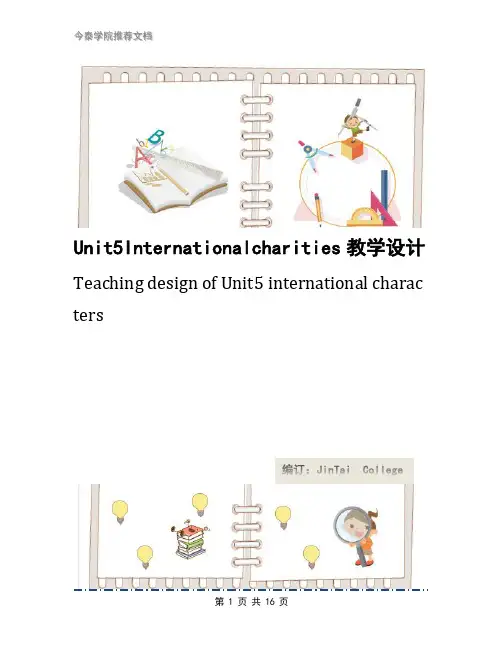
Unit5Internationalcharities教学设计Teaching design of Unit5 international charac tersUnit5Internationalcharities教学设计前言:小泰温馨提醒,英语作为在许多国际组织或者会议上都是必需语言,几乎所有学校选择英语作为其主要或唯一的外语必修课。
英语教学涉及多种专业理论知识,包括语言学、第二语言习得、词汇学、句法学、文体学、语料库理论、认知心理学等内容。
本教案根据英语课程标准的要求和针对教学对象是初中生群体的特点,将教学诸要素有序安排,确定合适的教学方案的设想和计划、并以启迪发展学生智力为根本目的。
便于学习和使用,本文下载后内容可随意修改调整及打印。
unit 5 international charities一.教学内容:unit 5 international charitiesgrammar二.教学目标:掌握unit5的词法结构和用法:ed to do/be used to doing/be used to do2.句型结构—表建议3.so …that /such…that/ too…to/ enough…to4.加后缀变名词三.经典讲解【典型例题】讲解一:used to do sth.sth that happened in the past , but now stops过去常常做某事,过去常常是,表示过去习惯性的动作或状态,但如今已不存在,后面加动词原形。
e.g. :以前我们步行去学校。
we used to walk to school. / we used to go to school on foot.(but we don’t walk to scho ol now. ).他过去常常志愿为老人做一些工作。
he used to volunteer to do some work for the old.(he doesn’t do the work any more now. )肯定句:我以前是班长。
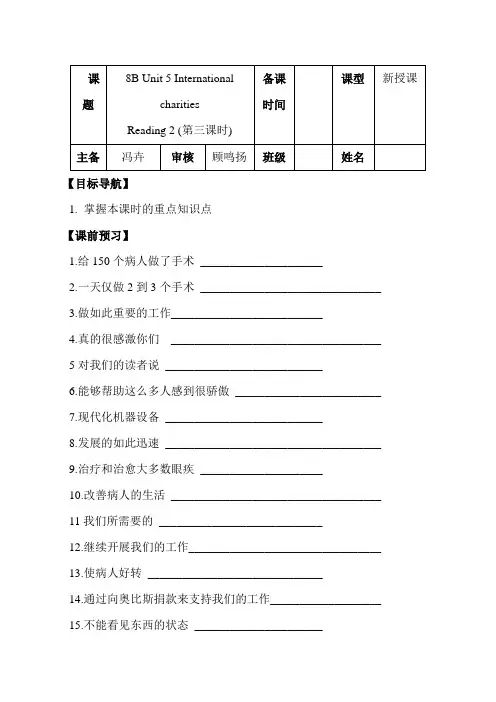
【目标导航】1. 掌握本课时的重点知识点【课前预习】1.给150个病人做了手术_____________________2.一天仅做2到3个手术_______________________________3.做如此重要的工作__________________________4.真的很感激你们____________________________________ 5对我们的读者说___________________________6.能够帮助这么多人感到很骄傲_________________________7.现代化机器设备___________________________8.发展的如此迅速_____________________________________9.治疗和治愈大多数眼疾_____________________10.改善病人的生活____________________________________ 11我们所需要的____________________________12.继续开展我们的工作_________________________________13.使病人好转______________________________14.通过向奥比斯捐款来支持我们的工作___________________15.不能看见东西的状态______________________16.有足够的钱去买东西________________________________17.引起某人发生改变________________________18.切开某人的身体____________________________________19.取出或修补一部分________________________20.住院______________________________________________21.80%的失明病例__________________________22.在富裕国家________________________________________【课堂检测】预习作业等级:一、单项选择:(5格*10=50’)二、填空:(5格*10=50’)1. UNICEF is an ____________ (国际) organization. It’s very popular.2. The good news is that most of the cases of blindness can __________(cure).3. Your health can be ____________ (影响) by a lot of elements(因素).4. The girl is __________ (感激of fire.5. Is he very ________ (自豪) that he can help many people?得分:【课后巩固】一、句型转换:二、用所给词的适当形式填空:1. I’m ________ (pride) of my school.2. ORBIS uses a __________ (fly) eye hospital to visit poor countries.3. The poor people don’t have the money for medical __________ (treat).4. Why don’t you ________ (work) in a hospital?5. We should try our best _________ (learn) English.6. They are __________ (thank) to you.7. The hospital received many __________ (donate) last year.8. The accident can ____________ (prevent) by people if they are careful.9. Those doctors use the plane as a ___________ (teach) centre.10. By _________ (send) messages to each other, we have made good friends.【能力拓展】一、完成句子:【课时反馈】【家庭作业】(选做:A.为有能力完成的学生的作业 B.为本学科学习较困难学生的作业)A. 完成自主检测本课时作业&背诵本课时短语B. 抄写本课时短语一遍&本单元单词一遍-- My uncle has 1000 men under him.-- He is really somebody. What does he do?-- A maintenance man in a cemetery.(墓地守墓人)。
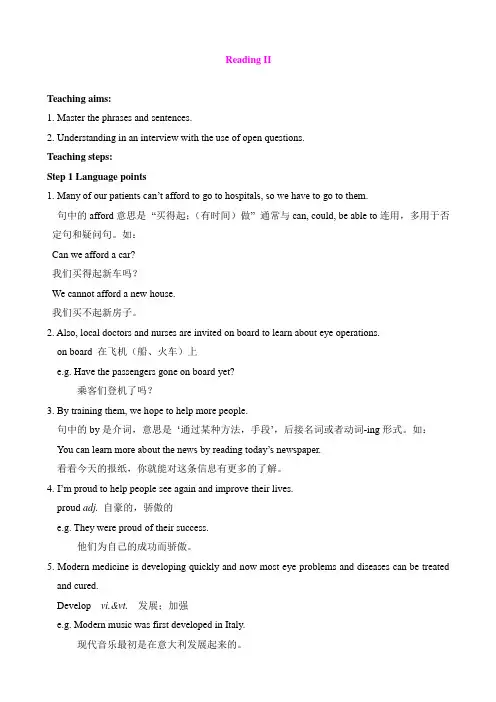
Reading IITeaching aims:1. Master the phrases and sentences.2. Understanding in an interview with the use of open questions.Teaching steps:Step 1 Language points1. Many of our patients can‟t afford to go to hospitals, so we have to go to them.句中的afford意思是“买得起;(有时间)做” 通常与can, could, be able to连用,多用于否定句和疑问句。
如:Can we afford a car?我们买得起新车吗?We cannot afford a new house.我们买不起新房子。
2. Also, local doctors and nurses are invited on board to learn about eye operations.on board 在飞机(船、火车)上e.g. Have the passengers gone on board yet?乘客们登机了吗?3. By training them, we hope to help more people.句中的by是介词,意思是…通过某种方法,手段‟,后接名词或者动词-ing形式。
如:You can learn more about the news by reading today‟s newspaper.看看今天的报纸,你就能对这条信息有更多的了解。
4. I‟m proud to h elp people see again and improve their lives.proud adj.自豪的,骄傲的e.g. They were proud of their success.他们为自己的成功而骄傲。
铁佛中学活页教案授课教师授课日期课型new 班级课题Unit 5 International charities Period 1 Comic strip & Welcome to the unit教学目标知识技能:To introduce students to some international charities过程与方法:To learn to use ‘used to’ and ‘be used to’情感态度价值观:Learn different names of international charities and their functions.教学重点1、know about international charities the sue of“be used to doing sth”2、the sue of“be used to doing sth”教学难点1、know about international charities the sue of“be used to doing sth”2、the sue of“be used to doing sth”集体备课个人修改教学过程一、创设情境、导入新课Step 1 Warming up by questioningWhat charities in China do you know of?What do they help?In this unit, we’ll learn some internationalcharities. What international charities doyou know of?Have you ever heard of famous international charities like: ORBIS, Oxfam, UNICEF, World Vision and World Wide Fund for Nature?二、预习设计、成果展示用所给的单词填空。
Integrated skillsTeaching aims:1. Understand the work of the United Nations children's fund category and basic backgroundknowledge.2. Talk about their ideas contribute to charity.Teaching steps:Step 1 RevisionReview the international charities we have learntWatch a video about “联合国儿童基金会宣传片”Step 2 Presentation new wordswar n.战争organize vt.组织Step 3 Read and answer1. When was UNICEF set up?2. What changed children’s lives at that time?3. How many countries and areas does it work in?Answers: 1. It was set up in 1946.2. The war changed the children’s lives.3. It works in over 190 countries and areas.Step 4 Put the sentences into right order.Daniel is listening to a radio programme about UNICEF. Help him put the sentences in the correct order. Write the numbers 1-5 on page 101.UNICEF provides basic education for poor children in many countries. It helps them go to school.UNICEF provides clean water and food. It wants all children to be healthy.You can help by donating money or working as a volunteer.UNICEF raises money by selling Christmas cards and organizing other activities.UNICEF works all over the world.Step 5 Answer the questions about UNICEFMr Wu asked the students to write a report on UNICEF. First, he gave them somequestions to help them organize their ideas. Help Daniel answer the questionswith the information in parts A1 and A2 on page 101.1. When was UNICEF set up?2. Why was UNICEF set up?Now UNICEF works in over _____________________. It helps governments,_____________ and families make the world _____________ for children.UNICEF wants all children to be ________, so it provides them with___________ and food, and tries to prevent them from getting illnesses.UNICEF also believes that it is important for children to receive ___________, so it helps them go to school.UNICEF raises money by ___________________ and organizing otheractivities. People can support it by donating money or working as volunteers.Step 7 Useful phrases1. 为孩子们将世界变成一个更美好的地方make the world a better place for children2. 为穷孩子提供教育和食物provide food and education for poor children3. 捐款make a donation4. 做一些志愿工作do some voluntary work5. 组织募集资金活动organize fund-raising activities6. 全世界all over the worldStep 8 Finish some exercises.1. UNICEF wants children to be _______ (health).2. UNICEF makes the world a ______ (good) place for children.3. It provides _________ (educate) for poor children.4. The organization raises money by ___________ (organize) activities.5. Many children’s ____ (life) were changed because of the war.Answers: healthy, better, education, organizing, livesStep 9 Homework.1. Preview the dialogue of “Speak up”.2. Write a short passage about the charity we have learned today.。
Unit 5 International charities江苏省宿迁市丁春侠Objectives:To talk about favourite charities.To use ―use to‖ to talk about a past habit or state.To use ―be used to‖ to talk about a thing we have done regularly for a long time.To use ―so … that ‖ or ―such … that …‖ to show the result of something.Period 1Comic strip & Welcome to the unitPreparation:Ask Ss to search and collect information about international charities. Ss are also supposed to bring some pictures to class.Teaching aims:Have the Ss know sth. about international charities and try to talk their favorite charities.To introduce Ss to some international charitiesTo prioritize needs in poor countries.Teaching contents:Words and phrases:international pocket further health carepocket money be used toSentences:I‘m not used to going out before lunch.Hobo, you used to be very kind to me.I‘m so weak that I can‘t walk any further.Teaching procedures:Comic stripStep 1. ReadingTell Ss to read the comic strip, ask some questions to check understanding.e.g.What does Oxfam need? (donations)What is Hobo going to do? (Donate money)Ask Ss how they feel about donating money to charities. Find out how much they know about why it is done and what the money is used for. Ask them what else they would consider donating.Step 2. AskingAsk Ss to read with partner and try to perform Hobo and Eddie according tothe comic strip. Then ask three or four pairs to perform this conversation before the class.Step 3. Pay attention to some useful expressions1) …leftT: What does ―left‖ mean here?e.g. There are only three students left.2) be used to doinge.g. He is used to getting up before 6:30 every morning.3) too…to…e.g. He is too weak to walk any further.Step 4. How charities help peopleT asks Ss to present their information and pictures of international charitiesand say sth. about their charities. Ss exchange their ideas.Assignment: Make a dialogue according to the comic strip. Ss should replace Oxform and use other words.Welcome to the unitStep 5. T introduces background informationThere are many international charities helping needy people and worthy causes all over the world. Look at some symbols in Part A. T uses these symbols to present the following charities. T puts the pictures with these symbols on the blackboard.Step 6. TalkingTalk about international charities and the work they do. Ask Ss Which international charities they know and write a list on the board.Step 7. Tell Ss To look at the symbols in Part A and the names of the charities in the box. Ask them to write the names of the charities under the pictures. Tell them to try to do the task on their own first, then compare answers with a partner. Step 8. Check answers as a class. Then Ss How much they know about what the charities in Part A do and how they help people.Step 9. Talk about what life is like for people who are very poor. Ask Ss to think about how their lives might be different if they had almost no money.Step 10. Divide the class into pairs. Ask Ss to look at the list of items in Part B and decide which items are the most important and which items are the least important for people in poor countries.Assignment:Be able to know more international charities and try to remember their full names.Exercises:据句意、首字母和中文意思完成句子。
1. I used to __________ (fly) kites in spring.2. We can go out for a walk __________ (后来).3. She is not used to __________ (travel) by train.4. What do you think people in poor (country) need most?5. I‘m too w__________ to go on walking.6. My father often takes me to the __________ near the park.7. I remember you have enough p__________ money.8. The little cat __________ (take) to the animal center.择题。
( ) 1. —Shall I tell John about it?—No, you __________. I‘ve told him already.A. mustn‘tB. needn‘tC. can‘tD. shan‘t( ) 2. —Where‘s my pen?—Oh, sorry. I have taken __________ by mistake.A. yoursB. youC. mineD. your( ) 3. —Can I get you a cup of orange?—__________.A. It‘s very kind of youB. With pleasureC. You can, please.D. Thank you for the orange( ) 4. The problem is __________ difficult for me __________ work out.A. very, toB. too, toC. so, thatD. enough, to( ) 5. He used to __________ with his parents.A. go swimmingB. going swimmingC. go swimD. going swim ( ) 6. I‘m used to __________ a doctor.A. isB. wasC. beingD. bePeriods 2-3 ReadingTeaching aims:1. Understand open questions used in an interview.2. Infer general meaning from title and context.3. Predict the meanings of specific words from close context4. Check understanding by linking parts of sentences.5. Summarize information by completing notes.Teaching contents:Words and phrases:affect mostly case cure medical treatment operation patient affordskill train operate indeed proud medicine treat improve richmedical treatment afford tooperate on used tobe used to sth / doing sth be grateful tocarry onSentences:Many of our patients are so poor that they can‘t afford to travel to hospital.When I worked in a hospital, I used to do only two or three operations a day.It‘s hard work and we need to work very quickly, but I used to it.You‘ve done such an important job that people must be really grateful to you.I‘m proud to be able to help so many people.Modern medicine is developing so quickly that we can treat and cure most eye problems and improve the lives of patients.Words:interviewer blindnessTeaching procedures:Part A:Step 1. Ask if Ss. Know anyone who works for a charity, and if so, which charity and what they do.Step 2. T writes ―ORBIS‖ on the blackboard. Ask Ss what they know about ORBIS or whether they have heard of it before doing the Welcome to the unit exercise.Talk about blindness and how it might affect a person‘s life.Step 3. Listen to the tape about the reading, and then ask Ss to read the text by themselves again.Step 4. Ask Ss some questions to check their understanding and encourage students to think more about the topic.T / F according to the dialogue.①Dr Ma woks in the hospital all the time.②There are about 45 million blind people in rich countries.③Most of the cases of blindness can be cured and prevented.④ORBIS is a hospital on a plane.⑤V olunteer doctors perform operations in a hospital.⑥Local doctors and nurses can learn from volunteer doctors and nurses.⑦During Dr Ma‘s last visit, he operated on two or three patients.⑧All the patients in poor countries don‘t need money.⑨Modern medicine can treat people problem‘s in poor countries.⑩We shouldn‘t send donations to ORBIS.Step 5. Ask Ss to do pair work. They practice the interview and perform Dr Ma and the interviewer. ( Three or four pairs perform the interview.)Step 6. Ask Ss to find out the language points in the conversation and analyze them. Part B:Step 1. Remind Ss that the vocabulary listed in Part B1 appears in the interview on pages 78 and 79. If Ss are not sure what a word means, it may help them toread the word in context on those pages.Step 2. Tell Ss to work on their own to complete Part B1.Step 3. Ask five Ss to each read out one word and its definition.Tell Ss to check their own answers.Step 4. Tell Ss to read the interview on pages 76 and 77 again, and use the information there to help them complete Part B2.Step 5.Tasks one student to read out Amy‘s article, pausing at the blanks. This student asks the other Ss for the correct words to complete sentences.Part C:Step 1. Explain the context of Part C1. Amy is looking at the ORBIS website and making note s. Step2. Sts. read Amy‘s notes and match the first halves of the sentences on the left with the second halves on the right by putting the correct letters in blanks.Step 2. Check answers as a class. Ask six Ss to read out one complete sentence each.Write the correct sequence of letters on the board so Ss can check answers. Step 3.Ask Ss to read Daniel‘s notes in Part C2 through first for overall meaning before they do the exercise.Step 4. Ask Ss to complete Daniel‘s notes by selecting the correct words from the words in brackets.Step 5. When Sts. have finished PartC2, ask volunteers to read out one sentence each.Assignment: Finish the exercises about Reading in workbooks. Exercises:根据提示完成句子。